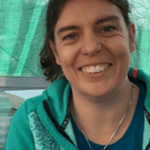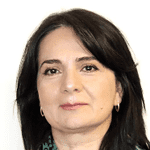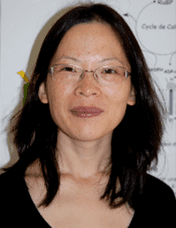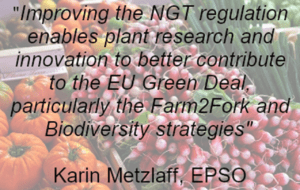NEWS
Stay updated on the latest developments in plant science policy and EPSO activities!
The 18th Europe-wide seminar of the series supported by the European Plant Science Organisation (EPSO) and aimed at the Plant Science community and its stakeholders.
TTT: The seminar will be held online each third Thursday of the month at three (CET).
On 15th December 2022 at 15:00 (CET) we will present two talks exploring “Remote sensing for increased agricultural sustainability”.


The seminars will be hosted on Zoom and last approximately 1.5 hours. Numbers will be limited to 300 attendees and therefore please register early if you would like to join. There will be ample opportunities to ask questions and join the debate. So please join us to support this new and exciting initiative for European Plant Science by following this link just prior to the start of the seminar.
EPSO members register in advance for this meeting:
https://us06web.zoom.us/meeting/register/tZcvf-2vrjgjGtUGh03VXYT3eUq3fcxKwszE
After registering, you will receive a confirmation email containing information about joining the meeting.
In the coming months we will be on the lookout for talented plant scientists among the EPSO membership to present their findings and perspectives to the EPSO seminar series. If we approach you to talk, we hope you will be happy to support the initiative. This is a fantastic opportunity for both eminent world leaders and talented up-and-coming early career researchers to present their research to an international audience and to network with potential collaborators. If you wish to suggest a theme for one of the spring seminars and / or nominate yourself or one of your colleagues to give a seminar, we most welcome your suggestions. Please contact Tim George ([email protected]) to provide your name and potential talk title.
We look forward to seeing you all for the 18th EPSO seminar on the 15th December 2022.
Tim George, Alan Schulman and Marie-Theres Hauser
EPSO Plant Science Seminar Series Organising Committee
Click here to read: Full EPSO news item
Contacts:
Tim George, Hutton / UK & EPSO Board
Alan Schulman, LUKE / FI & EPSO President
Marie-Theres Hauser BOKU / AT & EPSO Board
The pre-publication contains the WPs for Marie Curie (MSCA), Research Infrastructure; Clusters 1-2 and 4-6; Missions; and the European Innovation Ecosystems.
The pre-published Horizon Europe Work Programmes 2023-24 are made public before the adoption of the work programme to provide potential participants with the currently expected main lines of this work programme. Only the adopted work programme will have legal value. ….” Horizon Europe Work Programmes homepage
Cluster 6 – most relevant to EPSO members: Please find the Work Programme 2023-24 of cluster 6 (food, bioeconomy, agriculture etc.)
We suggest you register for the cluster 6 EC information days on 13-14 December 2022
The ERC WP 2023 was published in July: The ERC announced its Work Programme 2023 – around €2.2 billion supporting over a thousand top researchers across Europe. Call openings and deadlines – start preparing your proposals, 12.7.2022
EPSO will now update its Horizon Europe Briefing for our members which will be available in the coming weeks. Until then please use the hints in our Briefing for the 2021-22 WP on the Members’ only website.
Wishing you every success with your proposals,
Karin Metzlaff
Contacts:
Karin Metzlaff, EPSO
John Fitzgibbon, EPSO
EPSO is pleased to announce the publication of its 56th newsletter. The shorter public version of the Newsletter is available here. Please log in as a member and read the full version available in the members’ only section. The next edition of the EPSO newsletter will be spring 2023. Please send us your articles by early March. Happy reading!
Content of the full version
Editorial
- Our editorial article focuses on EPSO’s important role at European level of providing science advice to policymakers and how this is different from the lobbying activities performed by many Brussels based intermediary organisations. EPSO’s mission is to share the conclusions of plant science rather than lobby for a particular commercial objective.
EPSO activities
- EPSO reports on its annual General Meeting held last June in Bordeaux.
- The successful monthly EPSO Plant Science Seminar series is back after the summer break with a range of interesting topics providing a platform for experienced and talented young plant scientists to showcase their research.
- EPSO’s Working Groups report back on their activities over the past six months and what is in the pipeline for the coming months.
- As an official observer in the SusCrop ERA-Net, we report on the exciting SusCrop video contest offering a range of prizes of up to €1,000 in each of four categories on ‘What sustainable crop production means to you?’
- As the Fascination of Plants Day 2022 draws to a close, we profile just a few of the many examples that make this unique event a truly global affair.
Members’ news
- Good progress has been made on the Horizon 2020 InnCoCells project on cosmetic ingredients from sustainable plant sources.
- The CHIC project held a series of final events in Rome to round off the successful five-year Horizon 2020 project on New Plant Breeding Technologies using chicory for example in the development of water-soluble fibre for food products.
- Find out about the James Hutton Institute’s Root2Res and nitrogen fixing projects
- Wageningen Plant Sciences has a new General Director
- CRAG profiles its work on melon fruit ripening using genome editing and its study on the self-sufficiency of the female organ in plants
- New project launches include Forschungszentrum Julich’s HortiPrimed project and the Econutri project by the Agricultural University of Athens
- ETH-Zurich reports on interactions between root architecture and anatomy, and beneficial microbial associations
- A new Master course opens in Plant and Microbial Molecular Biology at the University Paris-Saclay
- An SLU academic wins the Bertebos Prize
National, European and global funding
- National Research Funding Opportunities in Portugal
- The 2023-24 Horizon Europe Work Programme is anticipated any time soon
- EPSO hosted a webinar on the Life programme with Executive Agency CINEA
Career opportunities and upcoming events
About EPSO
The International Advisory Council on Global Bioeconomy (IACGB) is an independent think tank composed of about forty high-level bioeconomy leaders and experts from all hemispheres, representing different backgrounds and expertise. While the members of the IACGB serve in their personal capacity, many of them also advise the bioeconomy landscapes and governments of the countries or regions to which they relate.
As members of the International Advisory Board on Global Bioeconomy and of EPSO, we want to inform EPSO members about the message the IACGB submitted to COP27, the 27th Conference of the Parties to the United Nations Framework Convention on Climate Change (COP27) summit in Sharm el-Sheik, Egypt: the IACGB statement is calling for recognition of the following valuable biological contribution to the economy in addressing climate change:
- Bioeconomy is essential yet often overlooked in climate change adaptation and mitigation policy and actions.
- A sustainable and circular bioeconomy offers a holistic approach for a more impact-focused cross-sectoral climate policy and action, especially in achieving reduced carbon emissions economy, new sustainable and climate-resilient pathways for growth and mobilizing citizen participation in climate action.
- Bioeconomy should be integrated in international climate action and its cross-sectoral feature makes it a gamechanger in further COP deliberations.
Three scientists involved in EPSO are member of the International Advisory Board on Global Bioeconomy: Elspeth MacRae / NZ is co-chair, Josef Glössl / AT and Ulrich Schurr / DE. In addition, the IACGB office is hosted at the Institute for Plant Sciences of the Julich Research Centre and Peter Wehrheim / DE (European Commission) is also a member of the IACGB.
EPSO will support the IACGB and help disseminate its activities.
The IACGB intends to act like a platform of platforms to facilitate international collaboration and mutual exchange in all aspects of relevance for sustainable and circular bioeconomy development by working together with multiple stakeholders across the globe, through leading representatives from policy, science, civil society and the business sector.
The IACGB initiates, designs and organizes the Global Bioeconomy Summit, a leading global conference and platform for exchange and discussion of recent developments for a sustainable and circular bioeconomy worldwide.
Read the full EPSO announcement here
Elspeth MacRae, co-chair IACGB; [email protected]
Ulrich Schurr, member IACGB; [email protected]
Josef Glössl, member IACGB; [email protected]
Karin Metzlaff, EPSO Executive Director, [email protected]
We would like to announce the seventeenth of our Europe-wide seminar series by the European Plant Science Organisation (EPSO) and aimed at the Plant Science community and its stakeholders. In our second year, we continue to provide a stimulating set of seminars once a month on a hot and/or emerging topic in plant science, giving the floor to both eminent world leaders and talented up-and-coming early career researchers.
TTT: The seminar will be held online each third Thursday of the month at three (CET).
On 17th November 2022 at 15:00 (CET) we will present three talks exploring Using algae to diversify production systems



The seminars will be hosted on Zoom and last approximately 1.5 hours. Numbers will be limited to 300 attendees and therefore please register early if you would like to join. There will be ample opportunities to ask questions and join the debate. So please join us to support this initiative for European Plant Science by following this link just prior to the start of the seminar.
EPSO Members register in advance for this meeting:
https://us06web.zoom.us/meeting/register/tZUkfu2hqjkiHdd_3qgdfqaVCnfiPlYHZ8ah
After registering, you will receive a confirmation email containing information about joining the meeting.
In the coming months we will be on the lookout for talented plant scientists among the EPSO membership to present their findings and perspectives to the EPSO seminar series. If we approach you to talk, we hope you will be happy to support the initiative. This is a fantastic opportunity for senior as well as early career researchers to present their research to an international audience and to network with potential collaborators. If you wish to suggest a theme for one of the spring seminars and / or nominate yourself or one of your colleagues to give a seminar, we most welcome your suggestions. Please contact Tim George ([email protected]) to provide your name and potential talk title.
We look forward to seeing you all for the next EPSO seminar on the 17th November 2022
Read the full news item here
Tim George, Alan Schulman and Marie-Theres Hauser
EPSO Plant Science Seminar Series Organising Committee
Contacts
Tim George, Hutton / UK & EPSO Board, [email protected]
Alan Schulman, LUKE / FI & EPSO President, [email protected]
Marie-Theres Hauser BOKU / AUT & EPSO Board, [email protected]
EPSO welcomes the approach to evaluate organisms on a case-by-case basis. EPSO notes that the suggested criteria, triggered by the breeding technique, will not allow for the discrimination between plants produced by targeted mutagenesis and identical plants produced by random mutagenesis.
EFSA has developed criteria – for consideration – for the risk assessment of plants produced by targeted mutagenesis, cisgenesis and intragenesis (EFSA Journal doi: 10.2903/j.efsa.2022.7618.).
Concerning the suggested criteria, EPSO raises several points regarding definitions of the terms “exact copy”, “History of [safe] use” (HoSU) and “familiarity” – see full first reaction file.
EPSO suggest determining these definitions before a thorough evaluation of the suggested risk assessment scheme can be made and EPSO is happy to contribute to this debate on a scientific basis.
EPSO looks forward to engaging as a major stakeholder with the European Commission, Member States and the European Parliament to achieve a well-balanced policy action on plants derived from targeted mutagenesis and cisgenesis. EPSO will continue providing scientific input in the course of the consultations with the EC and other stakeholders.
Read the full EPSO first reaction to the statement from EFSA regarding “Criteria for risk assessment of plants produced by targeted mutagenesis, cisgenesis and intragenesis.”, 20.10.2022
Contacts:
Jens Sundström, EPSO Chair WG Agricultural Technologies
Alan Schulman & Karin Metzlaff (EPSO President, Executive Director)


